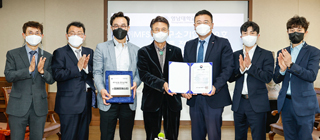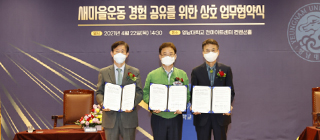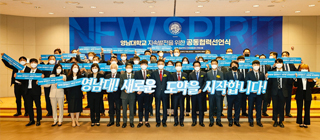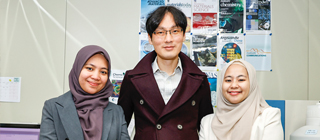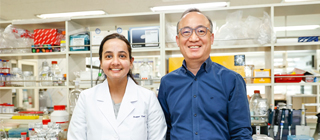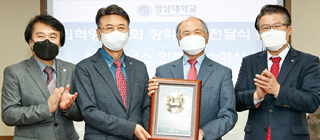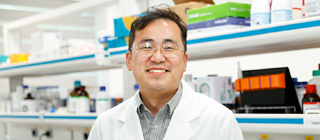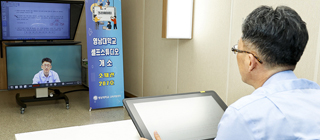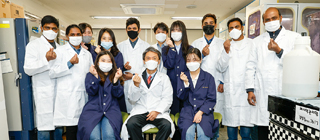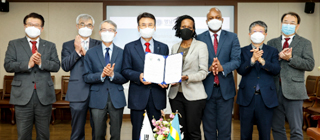-
Selected as no. 200 company of the Daegu R&D Special District... Attracting national R&D projects and accelerating technological commercialization Commercialization of ‘Anti-stress beverage containing GABA’ developed by Department of Food Science and Technology Professor Han Gi-dong [May 13, 2021] The first YU Technology Holdings subsidiary, MFST (CEO Han Gi-dong) was selected as ‘research institute company’ for the Daegu R&D Special District. The ‘Research Institute Company’ is a company established within the R&D Special District by investing 20% or more capital for commercializing technologies developed by public research institutes such as universities, government funded research institutes, and specialized production technology research institutes. MFST was selected as the 200th research institute company of the Daegu R&D Special District. Companies selected as research institute companies receive corporate tax cuts of 100% for three years and then 50% for two years by the government. MFST is the first subsidiary of YU Technology Holdings that was established in November of 2000 based on the anti-stress beverage technology containing GABA developed by YU Department of Food Science and Technology Professor Han Gi-dong. With the selection as a research institute company of the Daegu R&D Special District, MFST is expected to accelerate its efforts to attract national R&D projects and for the commercialization of its technologies. YU Technology Holdings currently has two subsidiaries such as MFST and the distribution and logistics business, YU Networks (CEO Lee Gyeong-soo). YU Technology Holdings CEO Lee Gyeong-soo said, “The technologies and research capacities possessed by YU have recently been recognized by government funded institutes and companies. We will continue R&D to create social values through the commercialization of outstanding technologies.” Meanwhile, the Daegu R&D Special District is a global conversion cluster that combines R&D and business functions utilizing advanced technology personnel and the innovative capacities of Daegu, Gyeongbuk and Gyeongsan areas, and it has established promising research institute companies in the region while commercializing the outstanding research achievements of local public research institutes and universities.
-
Local government - University - Saemaul Globalization Foundation enters MOU to share Saemaul Undong with developing countries Integrating the expertise of education and research of YU in Saemaul international development and the Saemaul globalization project of local governments Governor Lee Cheol-woo, “Collaboration with YU having expertise in Saemaul development crucial” [April 22, 2021] <Saemaul Globalization Foundation President Chang Dong-hee, Gyeongbuk Governor Lee Cheol-woo and YU President CHOI Oe-chool (from left) pose for a photo after entering an MOU for the activation of the Saemaul Undong to contribute to the eradication of poverty and for sustainable development of developing countries. In commemoration of the 51th anniversary of Saemaul on April 22nd, the three major entities of the Saemaul Undong such as Gyeongsangbuk-do, Saemaul Globalization Foundation, and YU teamed up to activate the Saemaul Undong to contribute to the eradication of poverty and sustainable development of developing countries.> On the afternoon of the 22nd at the YU Chunma Art Center Convention Hall, Gyeongbuk Governor Lee Cheol-woo, YU President CHOI Oe-chool, Saemaul Globalization Foundation President Chang Dong-hee, and others were in attendance for the MOU ceremony. With the signing of this MOU, these three institutes agreed for mutual cooperation in △joint operation of the Saemaul Globalization Foundation and the Gyeongbuk Gumi Saemaul Undong Theme Park △cooperation for the establishment of overseas Saemaul pilot villages and Saemaul training △mutual cooperation and personnel exchange such as forums and seminars to share the outcomes of the Saemaul Undong globalization with the international society △find and implement new contents and future strategy projects for the activation of Saemaul Undong globalization △proposals to the government and government agencies such as KOICA and the joint response plan sponsored by public sectors. In particular, this MOU was signed as Gyeongsangbuk-do, the location where the Saemaul Undong originated and that has continuously been leading projects related to Saemaul Undong since the 1970s, actively called upon YU for cooperation. The purpose of this is to integrate the expertise and knowhow on ‘Saemaulogy’ and ‘Saemaul international development’ systemized by YU into the Saemaul projects being pursued by local governments. YU President CHOI Oe-chool said, “By integrating the expertise accumulated in Saemaul studies and international development accumulated by YU with the Saemaul projects pursued by local governments, there will be synergy effects,” and added, “The Republic of Korea is a model case of recipients of official development assistance (ODA) that has changed from a recipient country to a donor country. We will team up with Gyeongsangbuk-do so that the economic and social development experience of Korea can be shared with developing countries through the Saemaul Undong and to promote development of those nations by utilizing the Saemaul Undong.” Gyeongsangbuk-do Governor Lee Cheol-woo said, “The administration is not enough for Gyeongbuk to prepare for the rapidly changing times during the fourth industrial revolution. Collaboration with YU that acts as the brain of the ‘Saemaul Undong’ with expertise is crucial.” He added, “I hope that this MOU will serve as the starting point of a great leap for the reawakening of Gyeongbuk’s Saemaul.” In 1976, YU established the ‘Department of Regional Social Development’ and over the past forty years, it academically systemized the Saemaul Undong through continuous academic activities, research and education related to regional social development and Saemaul Undong. In 2015, it changed the department name to the Department of Saemaul Studies and International Development, and it has been evaluated to have led the development of developing countries by fostering human resources in the Saemaul and international development sector. The Park Chung Hee School of Policy and Saemaul(PSPS) was established in 2011 to conduct Saemaul education for 763 social leaders from a total of 70 developing countries. Up until now, a total of 641 graduates of the PSPS have earned master’s degrees in majors such as ‘Saemaul studies’ and YU has been recognized as the hub university for the research and education of ‘Saemaul studies’ by the international community. Graduates of the Park Chung Hee School of Policy and Saemaul are currently serving as major policy legislators, international development experts, and Saemaul Undong leaders in the central governments, public institutes, and international NGOs all around the world. Furthermore, YU is providing academic research, education programs, and policy consulting by establishing institutes specializing in education and research in Saemaul Undong such as the Institute for International Development Cooperation and the Park Chung Hee Saemaul Undong Institute, etc. Gyeongsangbuk-do has been operating the Department of Saemaul(Division of Saemaeul Service) since 1973 to lead the Saemaul Undong both domestically and internationally. It is the cradle of the Saemaul Undong that has safeguarded the spirit of the Saemaul Undong for the past 50 years. Since 2005, it has been leading the 21st century Saemaul Undong through globalization projects for the Saemaul Undong. It has been establishing overseas pilot villages in 64 villages across 16 countries in Africa and Asia, and it has been planting a new model for Korean ODA projects by utilizing the Saemaul Undong such as fostering foreign leaders, establishing overseas institutes and research centers, holding international forums and seminars, and pursuing cooperation projects with international organizations and overseas companies. By constructing relevant organizations and infrastructure such as the launching of the Saemaul Globalization Foundation in 2013 and the establishment of the Saemaul Undong Theme Park in 2017, etc., it has been solidifying its position as the birthplace of the Saemaul Undong.
-
Students, professor, employees and the alumni association vow to ‘overcome university crisis’ YU president visits the alumni association, professors association, and labor union to urge to ‘work together for coexistence’ Recruiting outstanding students, improving the academic structure, procuring financial integrity, etc. contained in the ‘joint cooperation declaration’ [April 20, 2021] Members of YU (President CHOI Oe-chool) made a joint cooperation declaration to overcome the survival crisis and for the sustainable development of the university At this declaration ceremony held at the YU Chunma Art Center Convention Hall at 10 a.m. On the 20th, the main members of the university such as students, professors and employees, as well as the alumni association were in attendance. YU President CHOI Oe-chool, Alumni Association Chairman Jung Tae-il, Professors Association Chair Kim Sam-soo, Labor Union President Kwon Ki-young, and Student Council President Kim Dong-gyu gathered for this event. This is the first time that a university in Korea made a joint cooperation declaration for mutual development including even the alumni association in the current situation where the very existence of survival for universities have become a social issue. YU initially pursued a joint cooperation declaration among the college members. But the alumni association welcomed this news and stated their intent to participate in the joint cooperation declaration, and ended up joining the declaration. YU Alumni Association Chairman Jung Tae-il attended this declaration ceremony and said, “After hearing news that members of YU teamed up to overcome the current crisis, I could not standby idly as the chairman of the YU Alumni Association. Our 250,000 or so alumni that are working in all parts of society will share my thoughts.” He added, “I trust that our 250,000 alumni who are working hard for the nation and the Korean people will happily help for the development of our alma mater. Today’s joint cooperation declaration will act as the starting point.” In particular, CHOI Oe-chool, who was inaugurated as the president of YU back in February, actively worked to make this joint cooperation declaration. Even before his inauguration, YU President CHOI emphasized the importance of harmony among college members to recruit outstanding students, overcome the crisis of the university, and to achieve sustainable development. He visited representatives of the members such as the student council, professors association, and labor union to explain the university’s development plans such as recruiting outstanding students and asking them to give their support. They accepted President CHOI’s request, which resulted in this joint cooperation declaration to sound the signal for the new beginning of YU. YU Student Council President Kim Dong-gyu stated, “It is an honor to be able to represent the students at this place of harmony for all members of the university. The student council is also making various efforts to communicate with students. We will do our role as a bridge so that members of the college can communicate and harmonize with students.” The members of YU agreed to cooperate actively to overcome crises and for co-development based on mutual respect and trust as groups bound a common destiny. In particular, this declaration states that opinions of the members will be gathered for the goal of strengthening the competitiveness of universities and sustainable development through the recruitment of outstanding students, reform the academic structure, and procure financial integrity in order to actively respond to social demands. They made their first step for agreement of members to preemptively respond to environmental changes within and outside of the university such as the dropping school-age population. YU President CHOI Oe-chool commented, “YU, which has a history of 74 years, had faced countless difficulties over the time, and overcame each one of them. Today’s university environment is a crisis unparalleled to that of any past difficulties. But I believe in the capacities of the members of our university and believe that we are more than capable to overcome them.” He added, “At this time when it is difficult to foresee the future of our university, the student council, professors association, labor union, and even the alumni association pledged to work together and cooperate to overcome this crisis. YU now stands at a new starting line. We will recruit outstanding students and engage in specialized education to foster new human resources who will write new history. We are waiting for people who have huge ambitions and that will contribute to self-realization and to the human society. Let’s all work together to foster outstanding human resources that will create the new future.”
-
Outstanding structure and functions compared to existing technologies... To be used in the bio, energy and electronic parts and materials industry Published in the world acclaimed academic journal in materials, ‘Progress in Materials Science’ (impact factor 31.56) Paper cited dozens of times as soon as its release; receiving huge interest from researchers around the world with e-mails from global scholars, etc. [April 29, 2021] <School of Materials Science and Engineering Professor Koh Young-gun’s research team> The ‘Surface Control Technologies Using Electrolyte Plasma’ proposed by YU School of Materials Science and Engineering Professor Koh Young-gun’s (44) research team is receiving attention from academic circles all around the world. Recently, Professor Koh announced his research results of reforming surfaces using electrochemical methods by inducing aqueous solution plasma explosions, which are similar to volcanic explosions, at micro-levels on top of metals and activating its discharge energy. The outcomes of this study are receiving even greater attention as it is an eco-friendly technology that can replace the strong acid-based wet coating method that is currently being used. In addition to its structural properties such as anti-corrosion and anti-abrasion, functional properties such as bio antibacterial and photo catalysis were significantly improved, and as it is able to easily configure various colors, it is judged to be a platform material technology with high industrial potentials. There are anticipations that it can be used in various industrial sectors such as automobile, electronic parts, bio, and energy materials. In particular, Professor Koh suggested the concept of controlling energy explosion intensity through strengthened and softened plasma for the first time to academic circles. Professor Koh stated, “Just as a volcanic cone or crater forms after a volcano explodes, the size and intensity of plasma explosions can also be artificially controlled. Furthermore, as it is possible to control electrophoresis (phenomenon where particles inside a solution that added voltage move toward a pole in one direction), phase transition (phenomenon where the phase of a substance changes due to external variables), expansion, and penetration, it is possible to create new materials that go beyond the limitations of existing organizations and compositions.” The results of this study were published in the latest issue (Apr 2021) of the world acclaimed academic journal in materials <Progress in Materials Science> (impact factor 31.56) under the title ‘Principles, Structure and Performance of Electrolyte Plasma Surface Reform>. It is more surprising that this worldwide research achievement was from the proprietary research capacities of YU, rather than as joint research among prestigious foreign universities or research institutes. All of the four researchers included in this paper as authors were research professors conducting research at Professor Koh’s lab or PhD researchers being advised by Professor Koh. This attests to the fact that YU’s research capacities in the materials sector have risen to global standards. Recently, Professor Aleksey Yerokhin of the University of Manchester in England who is a global authority in this academic sector sent an e-mail to Professor Koh saying, “I would like to congratulate for publishing your research outcomes in a global journal. I am greatly interested in your paper.” He added, “I hope that we can develop a close cooperative relationship with the researchers at the University of Manchester.” Furthermore, there has been huge interest among researchers around the world in the materials sector in Professor Koh’s research achievements, as it was cited dozens of times in not even one month since the publication of his paper. Professor Koh revealed his plans for follow-up research saying, “Based on this research, we plan to research advanced materials needed for the fourth industrial revolution by creating materials technologies that are currently unavailable by using the individual features of solids, liquids and gases in the future.” Meanwhile, this research was conducted with the support of the middle-grade researcher support project by the Ministry of Science and ICT. <Schematic diagram containing the overall concept of Professor Koh Young-gun’s research applying the principles of volcanic explosions>
-
Suggested alternative for overcoming antibody tolerance... Comparative analysis on pros and cons of plant-based antibody material production techniques Listed in internationally prominent journals, selected as ‘People Who Made Korea Shine’ of the BRIC (Biological Research Information Center) “Can be used for development of antibodies by biotechnology companies” [April 16, 2021] <From left to right: Department of Biotechnology Professor Pragya Tiwari, Professor Bae Han-hong> A paper on ‘plant-derived antibodies’ presented by YU Department of Biotechnology Professor Bae Han-hong (56) is drawing attention from academic circles both at home and abroad. This paper is titled ‘Plant synthetic biology for producing potent phyto-antimicrobials to combat antimicrobial resistance’ and it was carried out by the internationally acclaimed journal in biotechnology <Biotechnology Advances> (Impact factor (IF) 10.744) in March of this year. YU Department of Biotechnology Professor Pragya Tiwari (38) participated as the lead author and Professor Bae participated as a corresponding author. This study was a review that briefly explained about antibody tolerance mechanisms and about how to use plant-based metabolites as an alternative for overcoming this. Comparative analyses were made on descriptions and the pros and cons of synthetic biology needed for efficiently producing antibodies based on plants and using metabolic engineering. Professor Bae said, “The advent of bacteria resistant against antibodies due to the abuse and the natural evolution of antibodies has become a huge issue worldwide,” and added, “The basic directions and methods of producing plant-based antibodies including medicinal plants were presented. It will be available to plant biotechnology companies to develop antibodies.” Recently, Professor Bae was selected as ‘People Who Made Korea Shine’ introduced by the BRIC (Biological Research Information Center). BRIC is Korea’s top institute for providing bio research information and was established in 1996. It carries papers in academic journals with impact factor (IF) of 10 or higher in scientific citation index (SCI) in the biotechnology sector, and introduces Koreans who achieved outstanding research accomplishments. The main field of research for Professor Bae is ‘molecular metabolic engineering.’ He studies the development of useful metabolites derived from ‘plants or microorganisms (endo-microorganisms) existing in plant tissues).’ In particular, his main focus of research is the mass production and utilization of saponin (ginsenoside), which is a major physiological material of wood-cultivated ginseng using microorganisms existing inside of the tissue of wood-cultivated ginseng, which is a medicinal plant representative of Korea.
-
Donated 690 million KRW including scholarships to his alma mater, YU, contributing to the development of the university Also held scholarship bestowal ceremony... Donated 430 million KRW in scholarships to juniors since 2012 Contributed to establishing landmarks of YU such as the ‘Chunma Tunnel Fountain’ and ‘Big Time’, a wall clock at the central library [April 13, 2021] CHOI Hyeok-young (78, third from left on photo above), chairman of the Choi Hyeok-young Scholarship Association, was selected as a member of the YU ‘Chunma Honors’ and received a plaque. ‘Chunma Honors’ is a program that was established in 2020 to honor donors. At 11 a.m. On the 13th, Chairman CHOIreceived a plaque from YU President CHOI Oe-chool at the YU President’s reception room. Chairman CHOI graduated from the YU Department of Civil Engineering as the class of ‘63 and has since then donated a total of 690 million KRW as development funds for the university, including scholarships for his juniors at YU. In particular, he contributed greatly to the establishing the YU campus landmarks such as the ‘Chunma Tunnel Foundation’ installed at the front gate of YU and the large clock ‘Big Time’ installed on the upper part of the outer wall of the YU Central Library in 2018. Chairman CHOI said, “All I did was share a little bit with my alma mater and juniors. I am very grateful to receive such a great honor.” He added, “As a ‘Chunma Honors’ member, I will continue to provide both material and emotional support for my alma mater and my juniors. I hope that more alumni will also become Chunma Honors members.”. <CHOI Hyeok-young Scholarship Association scholarship bestowal ceremony> Prior to the awarding of the ‘Chunma Honors’ plaque, a student scholarship bestowal ceremony was also held. On this day, Chairman CHOI gave a total of 190 million KRW in scholarships to eight YU students. While handing over the scholarship certificates to students, Chairman Choi said, “Dream big. And work hard to achieve your dreams,” while adding, “Success is achieved after overcoming many hardships and difficulties. Don’t feel rushed, but continue to work hard.” In particular, students who received the scholarships gave hand written letters to Chairman CHOI to express their gratitude. Lee Seo-young, a sophomore at the YU School of Chemical Engineering, said in her letter, “I believe I was given a very special opportunity as I was selected for the scholarship at a time where I have been having economic hardships. I wanted to write this letter to express my gratitude to Chairman Choi,” and added, “I am now able to focus on my studies as I was selected for the scholarship. I want to put down my economic burden a little and look out to the bigger world. I will not forget this feeling of gratitude as I live my life.” The Choi Hyeok-young Scholarship Association has handed over a total of 430 million KRW as scholarships for YU students since 2012. Chairman Choi founded the Choi Hyeok-young to continuously give scholarships to not only his juniors at his alma mater, but also to high school and college students nationwide. YU President CHOI Oe-chool said, “I believe that that Chairman Choi’s spirit of sharing was conveyed well to students. I hope that the students who received the scholarship today will move on to graduate and become professionals in their fields and live a life of sharing and contributing to society by receiving the lofty will of Chairman Choi.”
-
Overcoming the limitations of existing alginate capsulation technologies New technology for capsulizing all cells evenly at the desired thickness Can be applied as cell treatment development platform technology... Currently applied for domestic patents and PCT [April 9, 2021 YU College of Pharmacy Professor Jung Ji-heon's (37) research team developed new technologies for cell fine capsulation. The technology developed by Professor Jung’s research team is a new technology called STIG (surface-triggered in situ gelation) that can coat the surface of various materials including cell drugs at a constant size. This study was achieved through the joint research among Professor Jung, Dr. Pham Thanh Tung (post-doctorate researcher at Cornell) who graduated from the YU Graduate School of Pharmacy, and Keimyung University Graduate School of Pharmacy Professor Yuk Shim-myung’s research team. Alginate capsulation technologies currently used not only require expensive equipment for constant-size capsulation, but is also difficult to adjust the capsule size, and also has other issues such as several cells being capsulized simultaneously or there being empty capsules. This technology developed by Professor Jung’s research team produces micro-particles that can emit calcium ions needed for alginate capsulation procedures, and this particle attaches evenly on cell surfaces and reacts in alginate solutions for a certain period of time, so that the alginate’s gel reaction [phenomenon of changing sol (where particles are dispersed in the solution) turns into gel (where sol becomes thicker than a certain concentration to become solid) occurs on the cell surface. This technology has completed domestic patent application and an international application for PCT (patent cooperation treaty). Professor Jung said, “This newly developed technology will become a platform technology that can advance cell drug functions,” and added, “In particular, it is expected that it will be useful for locally delivering the drugs on the surface of cell drugs or for enhancing the transplantation survival rate of cell drugs.” This study was carried out as the National Research Foundation’s new researcher support project and leading research center support project (MRC), and the stage 4 BK21 project. The results of this study were published in the online issue of the world-acclaimed academic journal of the materials science sector, <Advanced Functional Materials> (impact factor (IF)16.836, top 4% of the sector).
-
YU offers full support to ‘improve quality and enhance learning effects’ of online classes Studio with high-tech equipment... Instructors can produce classes and videos and upload online [April 12, 2021] YU (President CHOI Oe-chool) is actively supporting efforts to raise the quality of learning in today’s age of online education. Recently, the YU Education Development Center opened the ‘Self Studio.’ The Self Studio that was opened is composed of three rooms such as Humanities Hall 205-1, Commerce Hall 213, and Materials Hall 207. They include high-tech systems such as two-channel recording systems, 50” prompters, full HD cameras, digital chalk boards, and digital audio mixers. There are currently four studios at the YU Education Development Center that supports online classes for instructors. By adding these three Self Studios, it has become easier for instructors to produce high quality contents. YU Education Development Center Director Cho Haeng-rae said, “The new Self Studios have a system environment for instructors to produce class videos and upload it online on their own without assistance from experts, and therefore, it has very high user convenience,” and added, “Plans are to construct additional systems so that real-time video classes can be given at the Self Studio. We will continue to provide support so that high quality education services can be offered to students.” Professors also had positive assessments of it after recording classes at the Self Studio. The professors said in unison, “The environment and video production system for giving lectures within the studio was constructed in an intuitive manner, and it was possible to record the class comfortably as if giving in-person lectures. An infrastructure for anyone to easily give lectures and produce video contents is constructed, so it is expected that it will be possible to offer better lectures to students.” Meanwhile, the YU Education Development Center is aggressively investing in its IT infrastructure to enhance the quality of online education. Real-time video lecture systems were implemented in the in-school LMS (lecture portal system) since March of this year and it is also possible to link with attendance and lesson recording, thus offering online education infrastructure with high user convenience for both instructors and students. In addition, education and consulting for activating online education are also being offered by the Education Development Center since last year. Teaching method lectures and 1:1 class consulting, etc. for instructors are being conducted to offer consulting on online education methods according to the types of classes such as major, general education, and practical classes, as well as lecture methods such as videos, real-time online classes, etc. Online study strategy education and 1:1 learning consulting is being offered for students as well.
-
Selected as the supervising institute ‘Cell Supporter Development Project for Mass Production of Cultured Meat’ by the Ministry of Agriculture, Food and Rural Affairs. Receive advanced investment from companies and 1.4 billion KRW in national funding to pursue project... Response to future food shortages Plans to develop ‘artificial beef’ and begin sales in 2025... Expected to preoccupy the global cultured meat market [April 13, 2021] <YU School of Chemical Engineering Professor Han Sung-soo Research Team> YU (President CHOI Oe-chool) will be in charge of ‘cultured meat’ research that will lead the future food industry with government support. YU School of Chemical Engineering Professor Han Sung-soo’s (Biomaterials Research Lab) Research Team was selected as the supervising institute for the ‘Cell Supporter Development Project for Mass Production of Cultured Meat’. This project is for developing cultured meat, which is artificial beef, being pursued as part of the future-response high value food development project by the Ministry of Agriculture, Food and Rural Affairs and the Korea Institute of Planning and Evaluation for Technology in Food, Agriculture and Forestry. Through the selection for this project, YU will receive 1.4 billion KRW in national funding until 2025 and pursue the project by investing a total of 1.9 billion KRW. This project will be joined by Chungbuk National University and the bio company, Medikan. Cultured meat is artificial meat made by attaching and culturing cells on edible supporters in a culturing device using cow muscle stem cells and medium (food) at a lab or plant without butchering livestock. It is different from plant-based alternative meat that is currently being sold on the market. By 2050, it is expected that the global population will be 9 billion and meat consumption is estimated at 465 million tons, thus requiring an additional 200 million tons of meat production every year. The only solution to this is developing cultured meat. Cultured meat is more eco-friendly and has much higher resource efficiency than producing meat using conventional livestock methods. It is possible to reduce land usage by 99%, gas emissions by 96%, and energy consumption by 45%. It will also become possible to eliminate poor ranching environments and the risk of livestock diseases, and also has the advantage in terms of animal welfare related to butchering and to produce beef customized to the tastes of consumers. It is therefore receiving attention as the future food industry. YU School of Chemical Engineering Professor Han Sung-soo, who is overseeing this project, said, “The global cultured meat market will be born in 2025 and it is expected that it will grow from 140 trillion KRW in 2030 to 700 trillion KRW in 2040, thus accounting for 25% of meat consumption worldwide. The key to the research is recreating the texture, taste and scent of natural beef, and producing it at low costs.” He added, “This study is also designed to complete development by 2025. In particular, this study is being pursued in earnest by global leading researchers and companies in the biotech sector to cope with future food resource shortages and to achieve animal welfare. Investments of 360 billion KRW were raised just last year, and in this business that YU is pursuing, a total of 2 billion KRW in research fund investments over the next five years at 100 million KRW from each of the four companies has been confirmed. Companies also revealed to invest up to a total of 40 billion KRW for commercialization after research is completed, for which discussions are being held, and therefore, there is high possibility for its commercialization.” Meanwhile, Professor Han Sung-soo, who is responsible for the research project, has made many research achievements in the polymer supporter sector while operating the organic gel cluster project team supported by the Ministry of Knowledge Economy (currently Ministry of Trade, Industry and Energy), and founded the YU-ECI Research Center and Cell Culturing Research Center to develop cell culture supporters and cell culturing research. Local governments such as Gyeongsangbuk-do and Uiseong-gun are also providing full support for Yu’s cell culturing research, and therefore, it is expected that the selection for this project will have synergy effects in other relevant research.
-
MOU with Rwandan Ministry of Education, pursuing establishment of ‘Department of Saemaul’ in Rwanda Government of Rwanda agrees to recommend international students to Park Chung School of Policy and Saemaul Continuing requests to establish local ‘Department of Saemaul’ in developing countries of Asia and Africa [March 22, 2021] <YU and the Rwandan Ministry of Education entered an MOU for the establishment of the Department of Saemaul at local university in Rwanda> (From left to right: YU President Choi Oe-chool, Rwandan Ambassador to Korea Yasmin Amri Sued) YU’s 'Saemaul Study,’ a native discipline of the Republic of Korea, was invited by the government of Rwanda of Africa. At 2 p.m. on the 22nd, YU entered an international exchange agreement for local education of Saemaul with the Rwandan Ministry of Education. This aims at implementing ‘Saemaul Study,’ which was systemized by YU, as an official education program and to spread knowhow for applying Saemaul Undong in Rwanda and the economic development of Korea through the Saemaul Undong. At this MOU signing ceremony, the Rwandan Ambassador to Korea Yasmin Amri Sued on behalf of the Rwandan Minister of Education. In November of last year, Ambassador Yasmin Amri Sued visited YU to discuss international development plans for Rwandan through the Saemaul Undong. At the time, YU introduced the activities of graduates of the Park Chung Hee School of Policy and Saemaul in their home countries, dual diploma system of Saemaul Studies with Western University of Cambodia, while making a proposal to establish a department at a local university in Rwanda, and held discussions continuously since then. With this official MOU with the Rwandan Ministry of Education, it is expected that a new wind of ‘Saemaul’ will blow within Rwanda. With this MOU, the two institutes agreed to ▲conduct pre-verification and recommendation of the Rwandan Ministry of Education for applicants to the YU Park Chung Hee School of Policy and Saemaul ▲recommendation of universities by the Rwandan Ministry of Education for the establishment of a local department of Saemaul ▲designate the Global Saemaul Development Network (GDSN) as an executive organization for the establishment of the local department of Saemaul and register as a local NGO. Ambassador Yasmin Amri Sued said, “I visited YU about four months ago to talk about Saemaul studies and the Saemaul Undong. I am happy to see that through discussions with my government, I was able to come back to YU to sign this agreement so quickly.” She added, “I believe that this exchange MOU with YU will be a great opportunity for the national development of Rwanda. I hope that this first step will be a giant leap for the development of Rwanda.” Until now, a total of 42 students from Rwanda studied at the YU Park Chung Hee School of Policy and Saemaul, and 38 of them received master’s degrees (excluding one who received a certificate of completion), and three are currently studying. Considering this high level of interest for the Saemaul Undong in Rwanda, it is expected that through this official MOU with the Rwandan Ministry of Education, there will be huge growth in demand for Saemaul education in Rwanda. YU President Choi Oe-chool said, “Even among other African countries, Rwanda is highly interested in national development and economic growth. I am confident that Korea’s national development experience and the Saemaul Undong will help with the development of Rwanda.” He went on saying, “I believe that among the numerous factors that affect social development, fostering human resources is the most important. Therefore, this international exchange MOU that we signed today has significant meaning. YU will provide full support for fostering human resources that will lead the development of Rwanda.” YU has spent the last several years leading the efforts to share Saemaul studies with the international community. In 2015, the Department of Saemaul Economic Development was established at the Enderun College in the Philippines and last year, the Department of Saemaul Economic Development was established at the Western University Phnom Penh Campus and Kampong Cham Campus in Cambodia. YU and Western University agreed on offering the ‘2+2 dual diploma program’ and so students of this department will study two years in Cambodia and then two years at YU and receive bachelor’s degrees in Saemaul studies from both universities. YU founded the Park Chung Hee School of Policy and Saemaul in 2011 and offered Saemaul education for 763 social leaders from a total of 70 countries, and so far, 641 people earned their master’s degrees in ‘Saemaul studies.’ Graduates are currently working as major policy-makers, international development experts, and Saemaul Undong leaders at central governments, public institutes, and international development NGOs.
